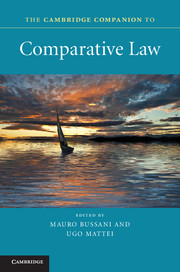Book contents
- Frontmatter
- Contents
- Contributors
- Abbreviations
- Preface
- Part I Knowing comparative law
- Part II Comparative law fields
- Part III Comparative law in the flux of civilizations
- 12 The East Asian legal tradition
- 13 The Jewish legal tradition
- 14 The Islamic legal tradition
- 15 The sub-Saharan legal tradition
- 16 The Latin American and Caribbean legal traditions
- 17 Mixed legal systems
- 18 Democracy and the Western legal tradition
- Index
- References
14 - The Islamic legal tradition
Published online by Cambridge University Press: 05 May 2013
- Frontmatter
- Contents
- Contributors
- Abbreviations
- Preface
- Part I Knowing comparative law
- Part II Comparative law fields
- Part III Comparative law in the flux of civilizations
- 12 The East Asian legal tradition
- 13 The Jewish legal tradition
- 14 The Islamic legal tradition
- 15 The sub-Saharan legal tradition
- 16 The Latin American and Caribbean legal traditions
- 17 Mixed legal systems
- 18 Democracy and the Western legal tradition
- Index
- References
Summary
Introduction
The Islamic legal system consists of legal institutions, determinations, and practices that span a period of over fourteen hundred years and arise from a wide variety of cultural and geographic contexts that are as diverse as Arabia, Egypt, Persia, Bukhara, Turkey, Nigeria, Mauritania, Mali, Indonesia, and India. Despite the contextual and historical contingencies that constitute the complex reality of Islamic law, rather paradoxically the Islamic legal legacy has been the subject of widespread and stubbornly persistent stereotypes and over-simplifications, and is highly contested and grossly understudied at the same time. Whether espoused by Muslim or non-Muslim scholars, highly simplified assumptions about Islamic law, such as the belief that Islamic legal doctrine stopped developing in the fourth/tenth century, the presumed sacredness and immutability of the legal system, or the phenomenon of so-called Qadi justice, are, to a large extent, products of turbulent political histories that contested and transformed Islamic law (or what is commonly referred to as Shari’a) into a cultural and ideological symbol. As part of the legacies of colonialism and modernity, Islamic law was then transformed into a symbolic construct of highly contested issues such as legitimacy, authenticity, cultural autonomy, or traditionalism, and reactionism, or religious oppression. Intellectually, there is a continuing tendency to treat Shari’a law as if it holds the keys to unlocking the mysteries of the Muslim heart and mind or, alternatively, as if it is entirely irrelevant to the formation and dynamics of Muslim societies. In all cases, however, because of the disproportionately politicized context of the field, Islamic legal studies remains largely undeveloped, and the discipline is plagued by inadequate scholarship, especially in the field of comparative legal studies. It is important to stress the point because, for all the generalizations one often encounters in the secondary literature on Islamic law, the reality is that, considering the richness of the legal tradition, our knowledge of the institutions, mechanisms, and micro-dynamics, discourses, and determinations of Islamic law in various places and at various times is very limited.
- Type
- Chapter
- Information
- The Cambridge Companion to Comparative Law , pp. 295 - 312Publisher: Cambridge University PressPrint publication year: 2012
References
- 4
- Cited by

